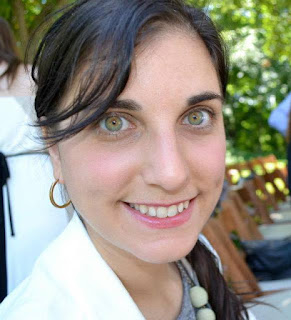Jennifer Fliss is the author of the new story collection The Predatory Animal Ball. Her work has appeared in a variety of publications, including The Rumpus and The Washington Post.
Q: Over how long a period did you write the stories in The Predatory Animal Ball, and how did you decide on the order in which they'd appear in the book?
A: I think the earliest story was from 2017 and the most recent was 2021. The order is almost the order in which they were written; however, I wanted to ensure there was some up and down in the emotion.
I don’t want to lull readers. I want them to get comfy and then POW, get hit by a gob of feeling or excitement. There is a reason rollercoasters slow down for a while before hitting you again with a rush downhill.
Q: How was the book's title chosen, and what does it signify for you?
A: The title is the name of one of the short stories, which is a fable-like tale about a mouse who accidentally receives an invitation for The Predatory Animal Ball.
It’s clearly not for him, but he decides to go to find out answers as to who killed his partner and left him in the midst of incredible sadness and loneliness.
Unintentionally, I find myself writing often about being a victim of abuse. This isn’t entirely surprising given my personal experience, but I did not set about trying to write it, it just because the subconscious theme of much of my work. Our world is made up of predator/prey relationships.
And on a literal basis – in the actual animal world, I get it, but in our lives as humans, we don’t have to exist in the same caste system, and yet we live in this way in almost every section of life.
What happens if you go to something not meant for you? If you break that glass ceiling? Attend the ostentatious ball that you were not invited to as you scrounge for little bits of cheese for sustenance?
Q: The author Sara Lippmann said of the book, "Fliss cleverly lulls us into the realm of myth only to subvert expectations, offering a destabilizing landing at once timeless and timely." What do you think of that description?
A: Lippmann is a wonderful writer. Her review was so generous.
I don’t know that I’m subverting expectations exactly. What would a writer be if they didn’t try to expose a little of the absurdity in our real lives?
When I write, I want the predators – the ones who usually win – to drop a few notches in the food chain (if not get devoured themselves). I suppose that can be seen as subverting the norm, but I think it’s not that uncommon in writing, or most art.
I do like to write in a magical place or use fabulist elements to highlight how in reality, our lives are usually even more ridiculous. Just take a look at the news right now: like, which is more absurd? What I am writing?
Like, say, a woman cracking eggs after a miscarriage only to find baby supplies in the yolks, or our reality where it’s really on the table that women will be forced to carry dead fetuses in their bodies for months?
Q: What do you hope readers take away from the book?
A: Enjoyment. I write primarily because I find it fun and satisfying. I read for the same reason and I want readers to experience that when they read my work.
I want someone to live in the words and worlds I’ve created. I want them to leave my pages and think Huh, hadn’t thought of it that way. And also that they should just go to the ball and not wait for an invitation.
Q: What are you working on now?
A: I’m always working on a thousand things. But in terms of larger projects, I’m about to go into some real focused time on my novels.
One is done and has gone through several rounds of revision, but needs some more (that one I keep procrastinating with because revision is so hard for me).
The other is exciting: another novel where I just have about 30-50 pages written. I believe in the story and the generative time – for me – is so exciting and the possibilities are endless.
I write what I want to read and when I tell people the premises, they sound excited too. So, hopefully both these novels will end up out in the world someday.
Q: Anything else we should know?
A: Just that writing is so much fun. A lot of people talk about how hard it is. And it can be, or aspects can be, but it doesn’t have to be. If someone wants to write, whether they have a talent for it or not, they should just do it.
Don’t worry about the expectations of others. Don’t stress about, say, your writing teacher and what they will think. That teacher is a tool for you – in the best way.
Use them, use their knowledge, and apply to your own self and work where necessary. Learning from many places and not just from one source of education is ideal.
Writing can be a lot of things. If it makes you unhappy, I don’t understand why you would do it.
--Interview with Deborah Kalb


No comments:
Post a Comment